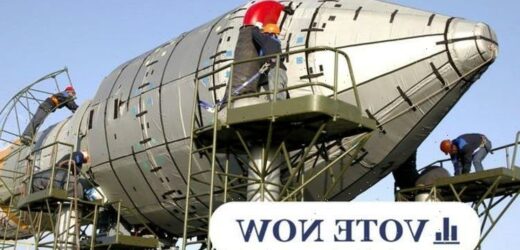Brexit: Expert discusses future of Galileo space project
We use your sign-up to provide content in ways you’ve consented to and to improve our understanding of you. This may include adverts from us and 3rd parties based on our understanding. You can unsubscribe at any time. More info
Galileo is a Global Navigation Satellite System (GNSS), similar to GPS, that will be used government agencies, armed forces and emergency services for precision navigation. When Britain voted to leave the EU, the country lost future access to this space system, even though several British companies had contributed substantially to the project.
————-
A report from the Government Office for Science warned that the need to improve the UK’s position, navigation and time-dependant (PNT) services over the coming years, is of “vital importance”.
As self-driving cars and boats are due to be introduced on mass over the next decade, there is no question of whether the UK needs a Global Navigation Satellite System.
In fear of being left behind in the global space race, the UK invested £364million into intelligence company OneWeb, a company that was on the brink of bankruptcy.
On September 7, OneWeb confirmed that it had completed a successful test of internet connection from space on a low-earth orbit.
Advanced GPS tracking is a service that the UK is hoping OneWeb will be able to offer too.
However, OneWeb is further behind in technological advancement than the EU’s Galileo project.

New analysis by the UK Space Agency SBPNTP has reported that if a future space satellite system owned by the UK were to fail, it could cost the UK a staggering £1.7billion per day.
Failure could be caused by solar storms and radiation that can fry electronics and disrupt communications.
If the UK were still involved in the shared Galileo project, then damage costs would be divided amongst member states, providing a safe guard against an economic burden that could cripple the country.
Can’t see the poll below? Click here.
According to the Telegraph, Civil servants and parts of the industry have pushed for the Government to revive talks on rejoining the EU’s Galileo system.
In June, Timo Pesonen, the European Commission’s Director General for Defence Industry and Space, told a briefing in Brussels: “The European Union is open to negotiate with the UK on its participation in the EU space programmes. The ball is in London, not here.”
“On Galileo, the European Union remains open to negotiate a PRS access agreement but, so far, the UK has expressed any interest.”

But it seems the UK Government are determined to step up to this challenge without the help of the EU, particularly as relations have become more and more strained in recent weeks over the French fishing row.
A spokesman for the Department for Business, Energy and Industrial Strategy said: “The Government has set a clear ambition for a sovereign space programme which will bring long-term strategic and commercial benefits for the UK.
“Work is ongoing across Government to determine the UK’s positioning, navigation and timing requirements, and assessing options for meeting them.
“The UK will not participate in the EU’s Galileo programme.”
Do you think the risks of taking on an independent satellite mission are too great for the UK? Vote now.
Stay up to date with Brexit, the SNP and news from Number 10 by signing up for the free politics newsletter here: /newsletter-preference-centre
Source: Read Full Article


